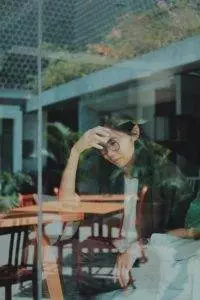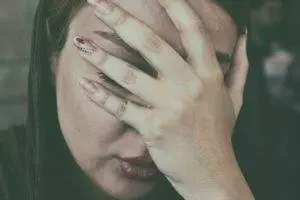By Qineng Tan, L.Ac, Ph.D. & Xiaomei Cai. L.Ac., Ph.D.

More than ever, people are struggling with feelings of sadness, anxiety, and isolation. Feeling empty or worried all the time, having difficulty concentrating, or even having thoughts of suicide are all possible symptoms of depression. Acupuncture has been shown to be effective for helping manage and overcome both low-grade depression and major depression.
Everyone feels worried, sad, or frustrated due to life situations and problems that come up periodically. But feeling persistently fatigued with heavy emotions for days, weeks, or months on end is a signal that a person might be clinically depressed, or in the throes of a depressive episode.
The current global pandemic is causing most of us to feel exhausted with worry over all kinds of issues: personal health, grief for loved ones who are alone, ill, or have passed, desperation over financial concerns, and feelings of being trapped or deeply pessimistic.
People who already had mental health problems, especially anxiety or depressive disorder, may feel like they have less support than ever, as they cannot see friends or family, and may not have access to meeting with a therapist online. People who have other chronic health conditions, like cancer or chronic pain, may be struggling even more than they normally would, feeling distanced from the care they need.
Everyone is dealing with tremendous stress right now, and we know that stress causes all kinds of health problems. Many people are already used to annual bouts of depression due to Seasonal Affective Disorder (SAD). Young people, most of whom have had to adapt to a wildly different form of learning this year, as well as being cut off from their friends, are even more prone to teen depression. Parents and caregivers are putting in extra hours, and may begin to feel helpless and hopeless in the face of this daily struggle. Truly, everyone is at risk for feeling situational depression in times like these.
Remember that treatment for depression is available, and if you are feeling despondent, it is in your best interest to reach out for help. Integrative care that includes different kinds of therapy may work for people who have not been able to find help for their depressive disorder. We are here at Art of Wellness to provide effective help for depression and chronic anxiety through acupuncture and TCM.
Signs of Depression
Many times people hide or deny their feelings of depression, even from themselves. It is important to recognize the signs and symptoms of depression so that if you or someone close to you if affected, you will be able to get help. Signs that someone is suffering from depression include:
- Changes in weight or appetite
- Changes in sleep habits
- Drug or alcohol abuse
- Difficulty concentrating
- Lack of interest in activities
- Fatigue, feeling tired all the time
- Angry, irritable all the time
- Loss of libido
- Backache, headache, or digestive problems
Signs of depression in teens and depression in women may cause other symptoms, similar to those of anxiety, like racing and intrusive thoughts, extreme sensitivity to criticism, or withdrawal from family and friends. Having trouble sleeping, or sleeping more than usual are potentially signs of depression, as are significant changes in a person’s eating habits, sudden weight loss or weight gain. Depression can also affect cognitive function and memory.
Top 10 Types of Depression

Depression is a mental health condition that is caused by combinations of different factors, and takes many forms in terms of symptoms and behaviors. Mental health professionals differentiate this condition into different types of depression, according to duration, severity, and specific kinds of behavior, emotional, and thought patterns:
-
Major Depression or Clinical Depression – is defined as an episode of sadness or loss of interest or pleasure in external stimuli one usually enjoys that lasts for more than two weeks.
-
Persistent Depressive Disorder or Dysthymia – this is a chronic mental illness characterized by a pessimistic outlook and sad mood that persists for years. In this case, people may have what is sometimes called “high functioning” depression. Even happy occasions do not bring them joy.
-
Manic Depression or Bipolar Disorder – this condition is marked by extreme changes in mood and energy. A person might, at times, feel so low that they have suicidal thoughts or lose touch with reality, then their mood may suddenly shift into high gear, and they seem to have boundless energy and confidence. These shifts may occur over short or long periods of time.
-
Postpartum Depression – colloquially known as the “baby blues,” many women experience a form of depression in the months after having given birth. This type of depression occurs because of sudden changes in hormones, and is often marked not only by fatigue and inexplicable feelings of sadness, but also feelings of anxiety, panic attacks, and disturbing thoughts.
-
Seasonal Affective Disorder (SAD) – this type of depression is relative to the time of year, that is, a person regularly goes through a recurrent period of fatigue and low mood, a sense of heaviness, and irritability, or difficulty getting along with other people. Most people with SAD experience it during the winter months, but it can actually happen at any time of year.
-
Psychotic Depression – this is a form of depression that is accompanied by a break with reality, including delusional or paranoid thoughts, and hallucinations.
-
Premenstrual Dysphoric Disorder (PMDD) – is an extreme form of premenstrual syndrome (PMS) that interferes with daily life during the 7-10 days preceding the period. It is characterized by severe depressed thoughts that can become suicidal in nature. Then, after the period, the symptoms disappear for a few weeks, until the premenstrual phase occurs again.
-
Atypical depression – in contrast to its moniker, this type of depression may be the most common. Atypical depression refers to a predictable pattern of depressive feelings and behaviors, including oversleeping, changes in eating habits, problems with relationships, that overtakes one for a while, then clears up when some kind of positive event occurs. This can turn into a pattern of depression that comes and goes over the years.
-
Situational depression – this type of depression occurs in reaction to some kind of inciting event, maybe one that causes trauma or loss, or simply a major life change like a move or job change. This is a way that some people will adjust to circumstances and stressors in life, and it usually clears up within six months or so after the triggering event.
-
Disruptive Mood Dysregulation Disorder (DMDD) – this is a disorder that occurs in childhood marked by chronic, extreme irritability and a struggle to handle negative emotions. Children with this order may regularly act out or have tantrums when facing frustration.
While some types of depression are considered more severe than others, it is important to keep in mind that all kinds of depression are real health conditions than can and should be addressed before they become even more serious.
Treatment for Depression
In Western medicine, depression is seen mostly as a chemical imbalance affecting hormones and/or neurotransmitters, primarily in the brain. Depression can be triggered by a highly emotional event or difficult circumstances, and then, the chemical imbalance continues to cause negative emotions and disordered thoughts. The conventional medical solution for most forms of depression is a combination of psychotherapy, also known as talk therapy, and prescription medication, in the form of antidepressants or anti-anxiety medications.
Modern psychotherapy aims to help people with depression through the practice of coping skills, problem-solving around relationship issues, and resolving negative emotions.
Different types of antidepressant medication include selective serotonin reuptake inhibitors (SSRIs such as Zoloft, Lexapro, Prozac, Paxil, and Celexa), which affect the way the hormone serotonin is produced and absorbed by the brain cells, and serotonin and norepinephrine reuptake inhibitors (SNRIs like Effexor, Cymbalta, and Pristiq), which influence norepinephrine production, as well. All of these medicines basically work by allowing the brain to have more “good mood” chemicals available. Other, less commonly used medications include second-generation antipsychotics, such as Abilify, which are usually used to treat mental illnesses such as schizophrenia and bipolar disorder, but which are sometimes tried when other medications have not helped.

Many people feel that they benefit from the mood stabilisation these medications can provide. Generally, doctors recommend taking the medications for one to two years, to prevent relapses of the depressive symptoms. However, some people find that they have a hard time coming off of certain antidepressant medications, and unfortunately, there are many unpleasant side effects associated with these drugs.
More than half of the people who take antidepressants report side effects such as:
- Headaches
- Dizziness, brain fog
- Weight gain
- Dry mouth
- Restlessness, trouble sleeping, insomnia
- Sexual dysfunction, loss of libido
- Nausea, diarrhea, constipation, or trouble urinating
- Skin rashes or vision problems
In some cases, these side effects may seem manageable in relation to the severe depression they were feeling before, but for others, these problems compound their dissatisfaction with life. More serious side effects, like heart or liver problems can also occur, especially in older people, or because of interactions with other medications used to manage chronic conditions.
Some research studies have shown that acupuncture treatment can be used as an effective alternative to antidepressant medications, or as an adjunct that helps to offset some of the unwanted side effects. This study showed, also, that patients felt an improvement in their mood and quality of life after only a few weeks of acupuncture treatment, whereas the patients taking antidepressants took longer to register the positive effects.
How Acupuncture Treats Depression
TCM takes a holistic view of health that makes it very effective for treating depression. Going back thousands of years, TCM philosophy has always acknowledged the fundamental connection between mental health and physical health. Emotions and thoughts are as integral to wellness as the proper functioning of the organ systems. Imbalances in organs can cause emotional problems, and vice versa. So, when an acupuncture practitioner addresses mental illness such as depression and anxiety, she is looking at the whole picture. While a medical doctor may see varied symptoms such as digestive trouble, headache, irritability, and trouble sleeping as disparate problems to be solved by different specialists, or treated with different medications, a TCM provider views all of these issues as being part of a particular pattern and treats that pattern as a whole.

According to TCM, depression is caused by stagnation, or blockages in the Qi (life force energy). It is usually related to stagnant energy in the liver, spleen, heart or kidneys. Liver Qi stagnation can cause strong feelings of frustration, stomach pain and digestive trouble, heartburn or tightness in the chest, and headaches. Heart or Spleen Deficiency patterns cause worrying, trouble sleeping, and poor appetite. Chronic cases of depression with anxiety are often related to Yin deficiency, which causes irritability, restlessness, poor sleep, and back pain. An acupuncturist looks at all of these symptoms and treats the appropriate pattern with acupuncture and herbs. Acupuncture will also help people by relieving stress, and helping to restore better sleep.
One study looked at patients diagnosed with minor depressive episodes and generalized anxiety. Patients who received ten acupuncture treatments showed significant improvement over those who did not.
A study designed to help show the effect of acupuncture on neural circuity and chemistry as it relates to depression combined acupuncture with antidepressants when treating women with major depressive disorder. The patients receiving both showed improved functional connectivity in the corticostriatal reward circuitry of the brain.
Another study showed that electro-acupuncture treatment has as positive an effect on norepinephrine levels as amitriptyline – a medication commonly prescribed to treat major depression disorder and anxiety disorders.
Can Acupuncture Help Depression During Pregnancy and Postpartum Depression?
Some forms of depression are specific to the area of women’s health. PMDD, pregnancy depression and anxiety, and postpartum depression can all be helped with acupuncture treatment, without the risk of side effects.
It is important, both for their own health and that of the expected baby, that women suffering from depression during pregnancy or in the postpartum period seek help. However, there are risks involved in taking medications during pregnancy. Antidepressant use has been linked to birth outcomes such as low birth weight and premature delivery. Acupuncture, which can provide innumerable benefits during pregnancy, is an option worth exploring to relieve symptoms of depression and anxiety during pregnancy.
Acupuncture Near Me for Depression
Depression can make it difficult to take action. Feelings of hopelessness and isolation can cause people to feel that they are beyond help. Stigma around mental health can cause people to hide their anxiety and extreme moods from others. But depression is a real and treatable illness. Whether you have been struggling with depression for a long time, or have just begun to feel worried about your mental health over the past several months, please do not hesitate to reach out to us at Art of Wellness. We are here to help you get past this depressed period and begin to feel hope and purpose again.
*This article is for education from the perspective of Traditional Chinese Medicine only. The education provided by this article is not approved by FDA to diagnose, prevent, treat and cure human diseases. It should not stop you from consulting with your physician for your medical conditions. Traditional Chinese Medicine is based on Qi, which is an invisible force that usually cannot be observed by modern science. Because science focuses on testing ideas about the natural world with evidence obtained through observation, these aspects of acupuncture can’t be studied by science. Therefore acupuncture and Chinese herbs are often not supported by double-blind, randomized trials, and they are considered alternative medicine therapies in the United States.
